Back to School: Parents, Religion, and COVID-19 Vaccination
Parents Are Hesitant About COVID-19 Vaccines for Their Children
Parents and guardians of children under the age of 18 are less likely to be vaccine accepters than those without children under 18 in their households, according to data from the latest PRRI-IFYC vaccine report.[1]About six in ten parents (61%) say they have gotten or will get a vaccine, 21% are hesitant, and 17% say they will not get a COVID-19 vaccine. By contrast, Americans without children under 18 in their households are more likely to be acceptant (76%) and less likely to be hesitant (13%) or refusers (10%).
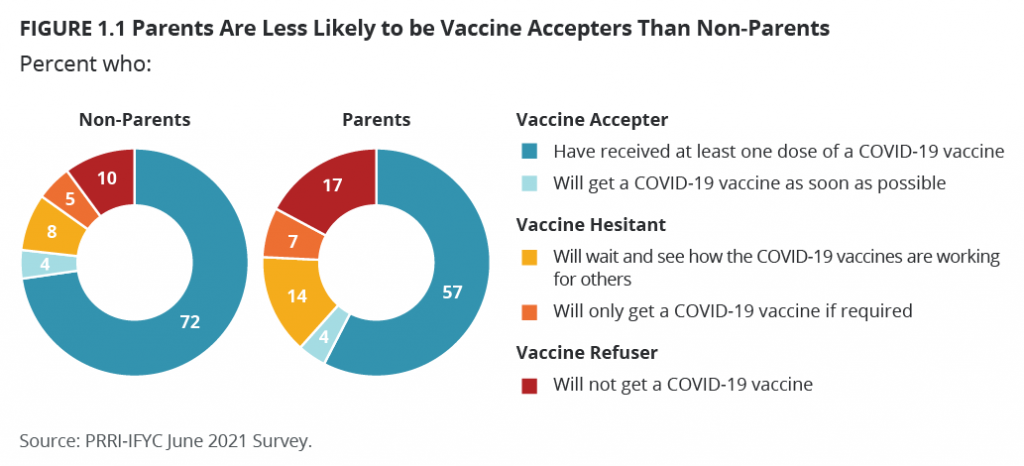
Not surprisingly, the approaches parents are taking with their children generally mirror their views about getting vaccinated themselves; however, even vaccine acceptant parents are more hesitant when it comes to their children. Slightly more than one-third of Americans who are parents of children under 18 (35%) say they will get their children vaccinated as soon as they can. Four in ten parents are hesitant to get their children vaccinated (40%), including slightly more than one in four parents (27%) who say they will wait to see how vaccines are working for other children and 13% who say they will only get their children vaccinated if it is required for work, school, or other activities. Around one in four parents of children under 18 say they will not get their children vaccinated (23%).
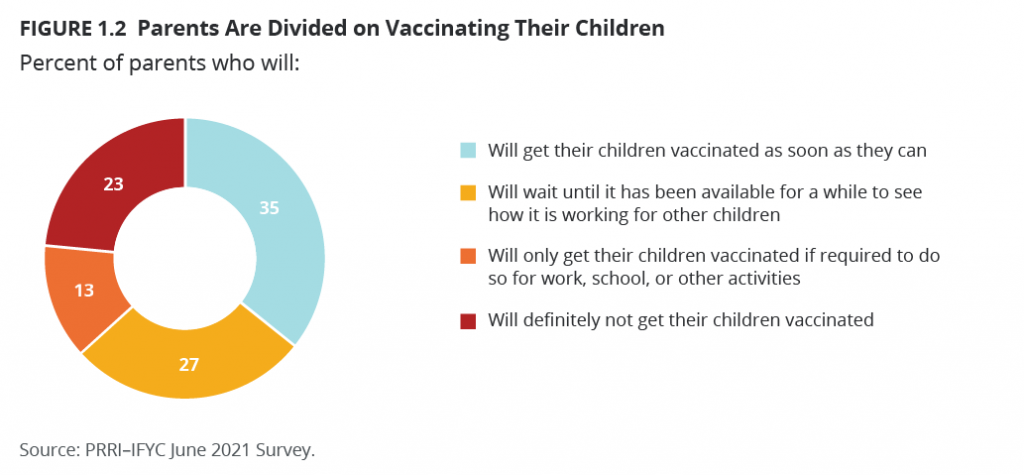
Among parents who are vaccine acceptant, 56% are vaccine acceptant for their children, 36% are hesitant, and 7% say they will not get their children vaccinated. Among vaccine hesitant parents, just 3% will get their children vaccinated as soon as possible, 81% are hesitant to get their children vaccinated, and 13% say they will not get their children vaccinated. Vaccine rejecters almost universally will not get their children vaccinated (94%).
White evangelical Protestants (18%) and Hispanic Protestants (27%) are the least likely religious groups to say they have gotten their children vaccinated or will get their children vaccinated as soon as possible. More than one-third of white evangelical Protestants say they are hesitant to get their children vaccinated (36%), and more than four in ten say they will not get their children vaccinated (42%). Hispanic Protestants are much more likely to be hesitant (52%) than to refuse vaccines for their children (19%). Around one-third of white mainline Protestants (33%), Black Protestants (35%), and religiously unaffiliated Americans (35%) are vaccine acceptant for their children. Four in ten white Catholics (40%) and around half of Hispanic Catholics (48%) say they have or will get their children vaccinated.
Half of Democrats (49%) are vaccine acceptant for their children, while 37% are hesitant and 12% say they will not get their children vaccinated.[2] More independents are undecided, with 33% acceptant, 47% hesitant, and 19% refusing vaccines for their children. Republicans are least likely to be acceptant (24%), while 38% are hesitant and more than one-third (36%) say they will not get their children vaccinated.
Americans of other races are most likely to say they will get their children vaccinated as soon as they can (56%), compared to much smaller shares of Hispanic Americans (39%), multiracial Americans (35%), white Americans (32%), and Black Americans (26%).[3]
Male parents are notably more likely than female parents to say they will get their children vaccinated as soon as they can (41% vs. 30%), and male parents of color are even more likely to say so than their white counterparts (47% vs. 37%). By contrast, there is no significant gap by race among female parents (29% among white female parents vs. 31% among female parents of color).
Parents with high school degrees or less are half as likely as those with postgraduate degrees to say they will get their children vaccinated as soon as possible (26% vs. 52%), while those with some college experience but no degree (31%) and those with four-year college degrees (45%) fall in between. Parents with high school degrees or less (29%) or some college (26%) are almost twice as likely as those with four-year degrees (14%) or postgraduate degrees (13%) to say they will not get their children vaccinated. Interestingly, the education gap is wider among female parents than among male parents. Nearly half of female parents (47%) and male parents with a college education (49%) say they will get their children vaccinated as soon as possible, compared to 24% of female parents and 35% of male parents without a college education.
Older parents are more likely than younger parents to say they will get their children vaccinated as soon as possible. While half of parents ages 65 and over (50%) and nearly half of parents ages 50–64 (47%) say they will get their children vaccinated as soon as possible, only one-third of parents ages 30–49 (33%) and one in four parents ages 18–29 (25%) say the same.
Disinformation about the pandemic and vaccination has driven vaccine hesitancy among parents too. The survey shows that QAnon believers (21%) are significantly less likely to say they will get their children vaccinated as soon as possible compared to QAnon doubters (29%) and QAnon rejecters (54%).[4]
Faith-Based Approaches Could Work for Parents
Faith-based approaches supporting vaccine uptake can influence parents to get themselves and their children vaccinated.[5] Three in ten parents with children under the age of 18 who are not yet vaccinated (23%) indicate that one or more faith-based approaches could help sway them, and among vaccinated parents, 22% said one or more faith-based approaches helped convince them to get vaccinated. Nearly half of unvaccinated parents who attend religious services at least a few times a year (35%) say faith-based approaches could convince them to get vaccinated, compared to 16% of those who seldom or never attend religious services. These percentages are slightly smaller among vaccinated parents who frequently attend religious services (39%) and who seldom or never attend religious services (12%).
Although the questions did not ask about decisions regarding children’s vaccinations, it is clear that some parents who are vaccine hesitant for their children could be swayed by faith-based approaches to get vaccinated themselves. Among unvaccinated parents, 31% who are hesitant to get their children vaccinated and 12% of those who say they refuse to get their children vaccinated say one or more faith-based approaches could convince them to get vaccinated themselves. These proportions are larger among those who attend religious services: Nearly half of unvaccinated parents who are hesitant to get their children vaccinated (48%) would be amenable to faith-based approaches, and nearly one in four of those who say they will not get their children vaccinated (24%) say they could be swayed by faith-based approaches. Among those who do not attend religious services, one in five unvaccinated parents who are hesitant about vaccinating their children (21%) and 3% of unvaccinated parents who will not get their children vaccinated say faith-based approaches could help sway them to get vaccinated themselves.
Among vaccinated parents, 24% who are hesitant to get their children vaccinated and 20% of those who say they refuse to get their children vaccinated say one or more faith-based approaches helped convince them to get vaccinated themselves. Nearly half of vaccinated parents who regularly attend religious services and are hesitant to get their children vaccinated (46%) said one or more faith-based approaches helped, and one-third of those who say they will not get their children vaccinated (24%) say they were swayed by faith-based approaches. Among those who do not attend religious services, few vaccinated parents who are hesitant about vaccinating their children (9%) or will not vaccinate their children (8%) say faith-based approaches helped sway them to get vaccinated themselves.
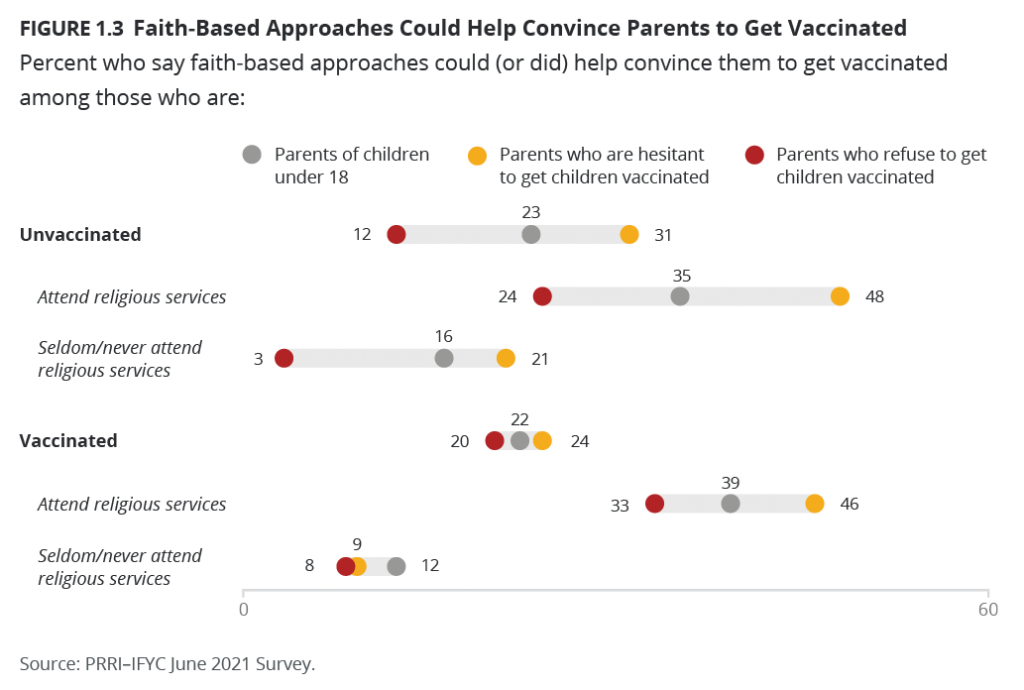
Religious Exemptions to Vaccine Requirements for Children
More than four in ten Americans (42%) agree that children should be allowed to attend public school without receiving required vaccines if they have religious objections. In comparison, nearly six in ten Americans (57%) do not support religiously based vaccine exemptions. These percentages have shifted considerably since January 2021, when more than one in four Americans (27%) supported religiously based vaccine refusals and nearly three in four Americans (73%) opposed such exemptions. Parents with children under the age of 18 are notably more likely than non-parents to support religiously based vaccine refusals in public schools (50% vs. 39%). A reason for the jump in support for religiously based vaccine refusals could be that the recent rollout of the COVID-19 vaccines for school-aged teens was top of mind for respondents in June, whereas questions of COVID-19 vaccine requirements for children were not prevalent in January, even though the question did not specify any particular vaccine.
Republicans are more likely to support religiously based vaccine refusals for public school children than independents and Democrats are. A majority of Republicans (58%) support the refusals, while more than four in ten independents (41%) and nearly three in ten Democrats (29%) favor them. Significantly more parents favor such refusals in all partisan groups. Among parents, 69% of Republicans are in favor of religiously based vaccine refusals, as are 49% of independents and 36% of Democrats.
Majorities of white evangelical protestants (63%) and Mormons (59%) agree that children should be able to attend public school without required vaccines on religious grounds. A majority of Hispanic Protestants (53%) also agree. More than four in ten other Protestants of color (46%), Black Protestants (45%), and white mainline Protestants (44%) support religiously based vaccine exemptions in public schools, as do 40% of white Catholics and Hispanic Catholics. More than one-third of other Christians (35%) and members of other non-Christian religions (36%), as well as 29% of both Jewish Americans and unaffiliated Americans, support religiously based vaccine refusals.
Support increases among parents in most religious groups. More than seven in ten white evangelical Protestant parents (73%) favor religiously based vaccine refusals for public school children. Majorities of Hispanic Protestant parents (55%), white Catholic parents (53%), and Black Protestant parents (52%) also support these refusals. Nearly half of white mainline (non-evangelical) Protestant parents (49%) and 44% of Hispanic Catholic parents agree. Just over one-third of religiously unaffiliated parents support religiously based vaccine refusals for public school children.[6]
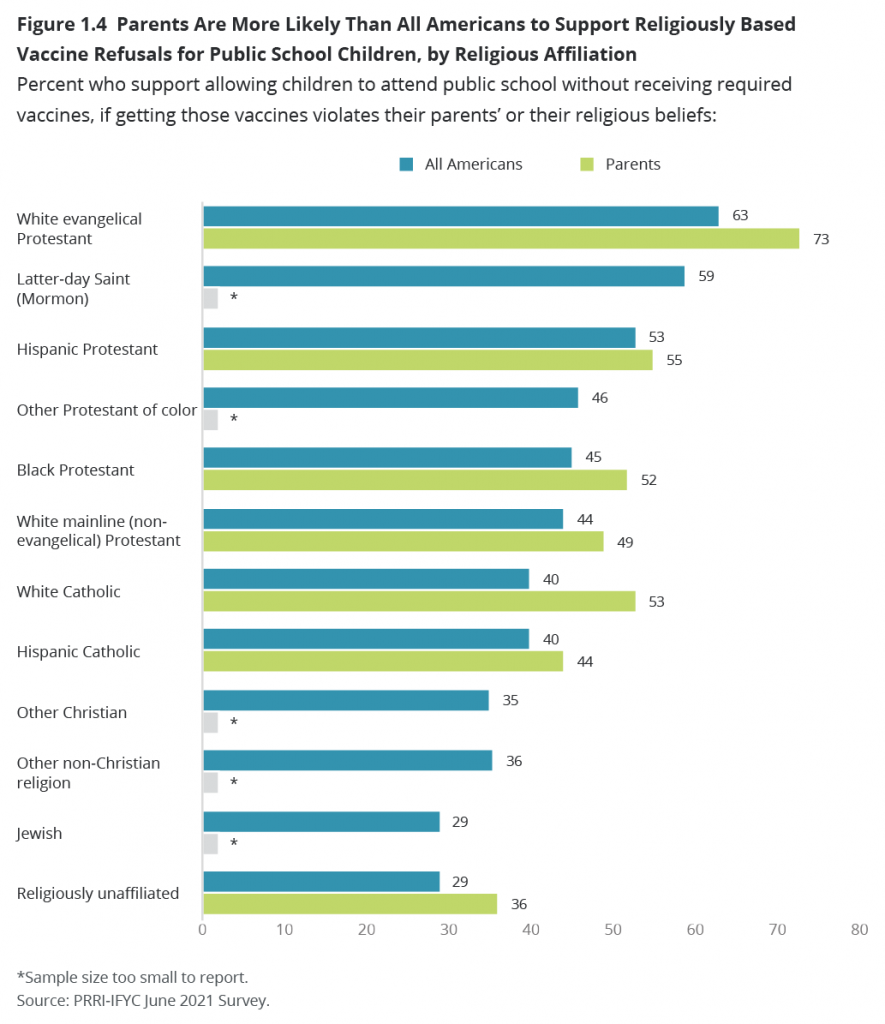
Even though there are no differences by gender on support for religiously based vaccine refusals for public school children (42% for both), the gap between parents and non-parents is wider among women (51% vs. 37%) than among men (48% vs. 39%).
Less than half of Americans with high school degrees or less and Americans with some college experience (both 45%) support vaccine exemptions for public school students. In comparison, less than four in ten Americans with four-year college degrees (39%) and more than three in ten Americans with postgraduate degrees (31%) support such exemptions. Parents without college degrees (53%) are notably more likely than non-parents without college degrees (41%) to support religiously based vaccine exemptions. Parents with college degrees (43%) are more likely than non-parents with college degrees (32%) to support religious vaccine exemptions.
Parents who say they will not get their children vaccinated (73%) are significantly more likely than those who hesitate to get their children vaccinated (52%) and those who say they will get their children vaccinated as soon as they can (33%) to support religiously based vaccine exemptions for children in public schools.
Survey Methodology
The survey was designed and conducted by PRRI and IFYC among a random sample of 5,123 adults (age 18 and up) living in all 50 states in the United States and who are part of Ipsos’s Knowledge Panel and an additional 382 who were recruited by Ipsos using opt-in survey panels to increase the sample sizes in smaller states. An additional 346 Hispanic Protestants were recruited to increase sample sizes among this group. Interviews were conducted online between June 7 and 23, 2021. The survey was made possible by generous support from the Open Society Foundations.
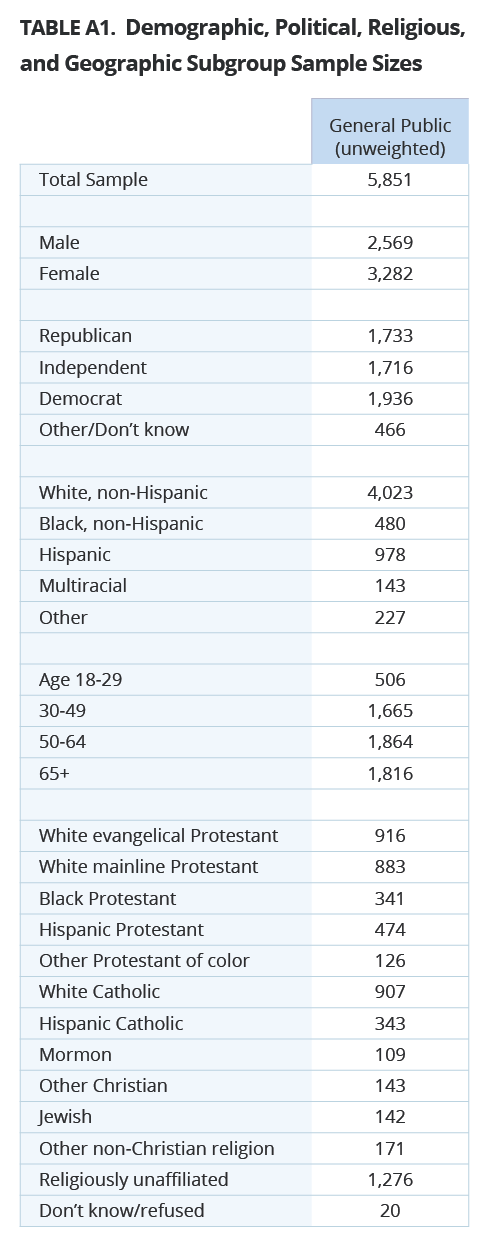 Respondents are recruited to the KnowledgePanel using an addressed-based sampling methodology from the Delivery Sequence File of the USPS – a database with full coverage of all delivery addresses in the U.S. As such, it covers all households regardless of their phone status, providing a representative online sample. Unlike opt-in panels, households are not permitted to “self-select” into the panel; and are generally limited to how many surveys they can take within a given time period.
Respondents are recruited to the KnowledgePanel using an addressed-based sampling methodology from the Delivery Sequence File of the USPS – a database with full coverage of all delivery addresses in the U.S. As such, it covers all households regardless of their phone status, providing a representative online sample. Unlike opt-in panels, households are not permitted to “self-select” into the panel; and are generally limited to how many surveys they can take within a given time period.
The initial sample drawn from the KnowledgePanel was adjusted using pre-stratification weights so that it approximates the adult U.S. population defined by the latest March supplement of the Current Population Survey. Next, a probability proportional to size (PPS) sampling scheme was used to select a representative sample.
To reduce the effects of any non-response bias, a post-stratification adjustment was applied based on demographic distributions from the most recent American Community Survey (ACS). The post-stratification weight rebalanced the sample based on the following benchmarks: age, race and ethnicity, gender, Census division, metro area, education, and income. The sample weighting was accomplished using an iterative proportional fitting (IFP) process that simultaneously balances the distributions of all variables. Weights were trimmed to prevent individual interviews from having too much influence on the final results. In addition to an overall national weight, separate weights were computed for each state to ensure that the demographic characteristics of the sample closely approximate the demographic characteristics of the target populations. The state-level post-stratification weights rebalanced the sample based on the following benchmarks: age, race and ethnicity, gender, education, and income.
These weights from the KnowledgePanel cases were then used as the benchmarks for the additional opt-in sample in a process called “calibration.” This calibration process is used to correct for inherent biases associated with nonprobability opt-in panels. The calibration methodology aims to realign respondents from nonprobability samples with respect to a multidimensional set of measures to improve their representation.
The margin of error for the national survey is +/- 1.65 percentage points at the 95% level of confidence, including the design effect for the survey of 1.7. In addition to sampling error, surveys may also be subject to error or bias due to question wording, context, and order effects. Additional details about the KnowledgePanel can be found on the Ipsos website: https://www.ipsos.com/en-us/solution/knowledgepanel
Endnotes
[1]Three in ten Americans (30%) report that they are the parent or guardian of at least one child under age 18.
[2]Sample sizes for Jewish, other non-Christian, other Christian, Latter-day Saint, and other Protestant of color parents are too small to report.
[3]Americans of other races” includes Asian American or Pacific Islander, Native American, and any other single race or ethnicity. Categories were combined due to small sample sizes.
[4]QAnon beliefs are measured based on respondents’ feelings about three statements: (1) The government, media, and financial worlds in the U.S. are controlled by a group of Satan-worshipping pedophiles who run a global child sex-trafficking operation; (2) There is a storm coming soon that will sweep away the elites in power and restore the rightful leaders; and (3) Because things have gotten so far off track, true American patriots may have to resort to violence in order to save our country. Believers mostly agree with these statements, whereas doubters are generally negative toward them and rejecters strongly disagree with all three statements.
[5]Faith-based approaches include: a religious leader you trust got a vaccine; you could get a vaccine at a nearby religious congregation; a religious leader you trust encouraged you to get a vaccine; a local religious community you trust held a forum to discuss the safety of the vaccines; a local religious community you trust provided assistance in getting an appointment to get a vaccine; a member of a local religious community you trust got a vaccine; a local religious community you trust created informational materials that answer common questions about the vaccines; a member of a local religious community you trust addressed your concerns about the vaccines; a healthcare professional from a local religious community you trust addressed your concerns about the vaccines; and a local religious community you trust provided information about the vaccines on social media.
[6]Sample sizes for Jewish, other non-Christian, other Christian, Latter-day Saint, and other Protestant of color parents are too small to report.




